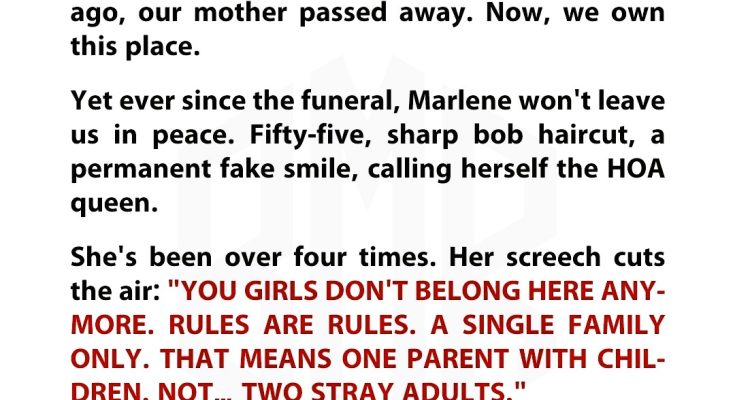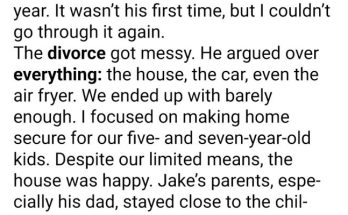I’m Claire, 20, and my sister Iris is 18. After our parents died—Dad from a heart attack, Mom from cancer—we clung to the only home we’d ever known. Every corner held memories: blanket forts during thunderstorms, Dad’s barbecue summers, Mom’s banana bread scent drifting through the halls. It wasn’t just a house—it was our sanctuary, our history. But grief wasn’t the only storm we faced. The HOA knocked, not with condolences, but with eviction threats. They said we violated “single-family” rules. We were sisters, not enough to count. And just like that, our home was under siege.
Marlene, the HOA head, showed up with her pastel cardigans and plastic smile, calling us “stray adults.” She claimed the bylaws didn’t recognize siblings as family. Her words stung, but her intent was worse—she wanted us gone. Iris and I were still reeling from Mom’s funeral, and now we were being told we didn’t belong in our own house. The legal consultant she brought handed us a violation notice. We were given 72 hours to vacate. It felt surreal. Our names were on the will. Our memories were in the walls. But to them, we were just technicalities.
We didn’t back down. That night, fueled by rage and bad coffee, Iris and I launched a campaign. We printed the bylaws, highlighted the absurd clause, and wrote heartfelt appeals. Then we knocked on every door in our neighborhood. “We’re being evicted because we’re sisters,” we told them. Shock turned into support. Parents worried about their own kids’ futures. Retirees offered to collect signatures. A teacher shared her own HOA horror story. Within days, we had dozens of allies. Our grief had sparked a movement. We weren’t just fighting for our home—we were fighting for what family means.
The pressure mounted. Neighbors rallied. Some even confronted Marlene directly. She didn’t answer her door. But the silence spoke volumes. Ten days later, a letter arrived from the HOA board. It was a quiet retreat: “premature and misinterpreted,” they said. No mention of Marlene or Mr. Bradshaw. Just a vague apology and a promise of no further action. We read it three times before believing it. The threat was gone. But something bigger had happened. The neighborhood had awakened. People were talking about rewriting the bylaws, running for board positions, even dissolving the HOA entirely.
Mrs. Collins, our elderly neighbor, brought peach cobbler and sat with us on the porch. “We’ve all been afraid of that woman for years,” she said. “You girls reminded us we don’t have to be.” Her words meant everything. We hadn’t meant to lead a revolution. We just wanted to stay in the home our parents built. But by standing up, we gave others permission to do the same. The fairy lights Dad strung years ago flickered above us as we ate grilled cheese and tomato soup. For the first time in months, the air felt light again.
Iris asked, “Do you think Mom and Dad would be proud?” I didn’t hesitate. “Yeah. I do.” We weren’t just preserving memories—we were creating new ones. The house wasn’t just surviving. It was thriving. And so were we. Marlene passed us at the mailbox one day, her posture less rigid, her eyes avoiding ours. We didn’t need her approval. We had something stronger: community, resilience, and each other. The bylaws hadn’t counted us as family. But the neighborhood did. And in the end, that mattered more than any clause or technicality.
We learned that grief doesn’t have to be silent. It can be loud, defiant, and transformative. Our fight wasn’t just about property—it was about belonging. About saying, “We’re here. We matter.” The HOA tried to erase us, but we became the ink. Our story spread, not just through documents, but through voices, signatures, and solidarity. We didn’t just save our home. We redefined it. And maybe, just maybe, we helped others do the same. Because family isn’t just blood or legal definitions. It’s love, memory, and the refusal to be erased.
So when people ask what happened, I tell them this: We were two grieving sisters, threatened by bureaucracy, but saved by courage. We turned a violation into a victory. We reminded a neighborhood what family really means. And we stayed. Not because we had the right paperwork, but because we had the right to be there. This house is ours. Not just legally—but spiritually. And no HOA clause can ever take that away.

